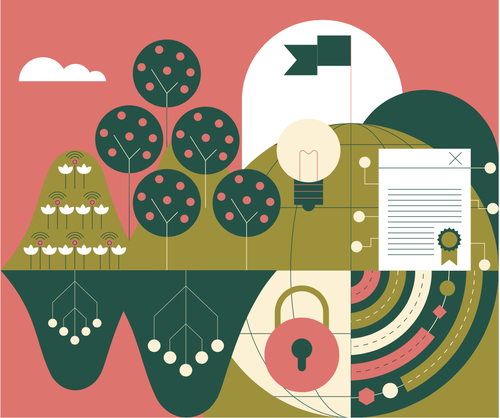Primavera De Filippi and Tony Lai take a different tack, exploring a fictional post-COVID future through the eyes of Leia, whose community embraced decentralised technology following the crisis, as she talks to others from different communities which followed different paths.
Hope is a slighter, tougher thing even than trust. ... In a good season one trusts life; in a bad season one only hopes, but they are of the same essence: they are the mind's indispensable relationship with other minds, with the world, and with time.
Ursula Le Guin
Leia looked back at the wildflowers blooming across the rolling hills, shepherded by trees with branches laden low with fruit. The trees drew nourishment from the rich soil of the local Learning Site. Although invisible to many a visitor’s eyes, a closer look would have revealed the myriad of sensors carefully camouflaged within the natural landscape. Mimicking the mycelial networks that nourished and connected the roots of each living thing, the local bioregion simulator gathered data from both the sensors and local community member input, monitoring each plant to ensure its needs were satisfied. Leia smiled, and wondered if tonight’s community cooking crew had mushrooms on the menu.
In a few seconds, the handshakes between her credentials management system and the Learning Site were completed, and the doors swung open. The procedure seemed straightforward, yet what just happened in those few seconds represented over a decade of work by millions of contributors building the open-source software and legal infrastructure of Leia’s world in 2030.
During the 2020s pandemics, Leia’s family had watched public officials fall into patterns of denial and blame, as the public health crisis had become a global economic crisis, eradicating trust in public institutions. In the midst of the uncertainty and chaos unleashed by the pandemics, many families had started organising into communities for resilience and support. Mutual aid groups had formed, with neighbours reconnecting, offering a helping hand to one other. Leia’s family had gathered in one of these communities, special in that it actually grew stronger and more resilient over time, and all members were responsible for sharing their learnings and best practices with other communities, wherever possible. Today’s meeting at the Learning Site was for precisely this purpose.

An image of an open hand, offered in friendship, hung over the entranceway. Walking into the Learning Site’s main hall, Leia looked across to the adults and children clustered at various stations around the room. Some were gathered around tables, planning new irrigation projects to support the grow sites nestled into the three-dimensionally rendered topography of her local bioregion. Others were engrossed in their own learning programs, specially tailored for them from a combination of template programs collectively shared and maintained among all the connected Learning Sites.
Branching out from the main hall was a series of collaboration and storytelling facilities, rooms decked out with cameras and recording equipment to log every brainstorm and workshop within. Leia was not bothered by any of these sensors: her data trust interfaced with the Learning Site systems to keep any data carefully protected and managed on her behalf. Whenever she was recorded, specific licensing agreements were created, ensuring that the benefits of her ideas were always shared within the community. And if an idea had the potential to address a global challenge, it was made available to the global commons, with legal engineering ensuring proper recognition and fair distribution of royalties.




